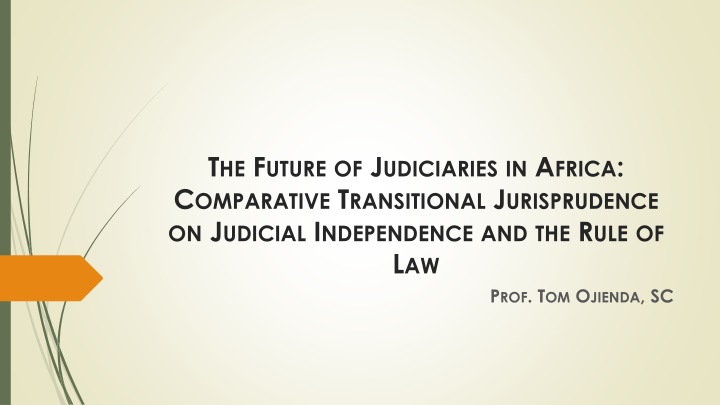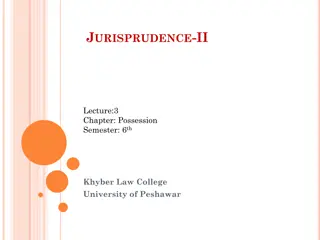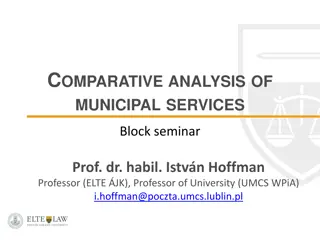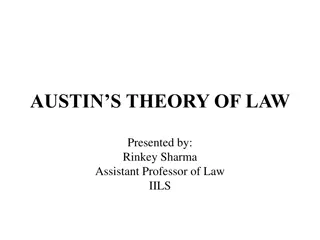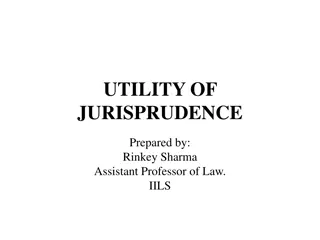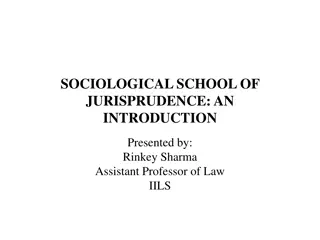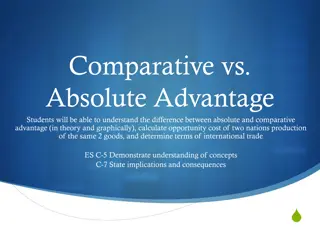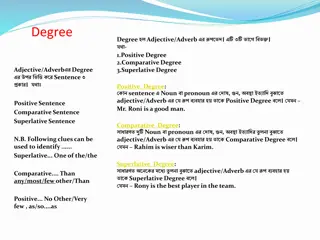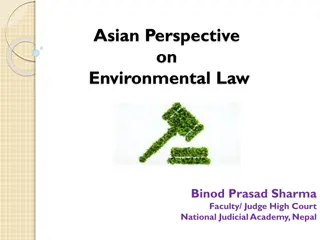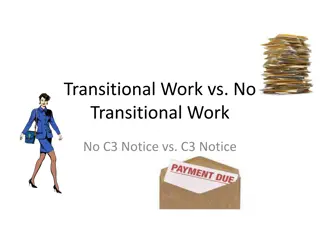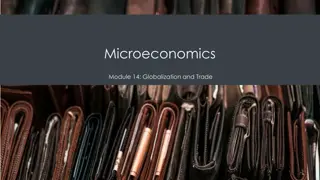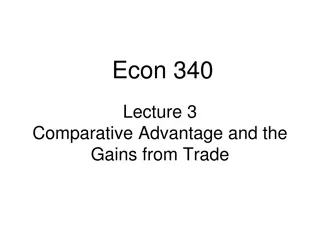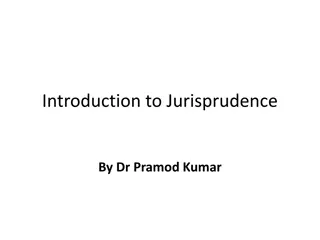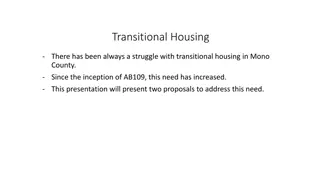The Future of Judiciaries in Africa: Comparative Transitional Jurisprudence
Judicial independence in Africa is crucial for upholding the rule of law and fostering economic growth. This article explores the key aspects of judicial independence, the challenges faced in implementing it, and the impact on governance and human rights. Countries in transition, such as Kenya, are especially important to study in this context. The discussion also delves into international standards and treaties related to judicial independence and how they are viewed and applied in African nations.
Download Presentation

Please find below an Image/Link to download the presentation.
The content on the website is provided AS IS for your information and personal use only. It may not be sold, licensed, or shared on other websites without obtaining consent from the author.If you encounter any issues during the download, it is possible that the publisher has removed the file from their server.
You are allowed to download the files provided on this website for personal or commercial use, subject to the condition that they are used lawfully. All files are the property of their respective owners.
The content on the website is provided AS IS for your information and personal use only. It may not be sold, licensed, or shared on other websites without obtaining consent from the author.
E N D
Presentation Transcript
THE FUTURE OF JUDICIARIES IN AFRICA: COMPARATIVE TRANSITIONAL JURISPRUDENCE ON JUDICIAL INDEPENDENCE AND THE RULE OF LAW PROF. TOM OJIENDA, SC
CONTEXTUAL BACKGROUND Judicial independence is a prerequisite for sustaining the rule of law and economic growth. There is no common understanding of what judicial independence exactly means, or how to measure it Judicial independence incorporates a number of key features: the independence and impartiality of judges, the autonomy of the judiciary, and the efficacy of its judgements. International guidelines, standards and initiatives provide a checklist of principles and guarantees of these aspects of judicial independence.
CONTEXTUAL BACKGROUND (CONT.) The absence of judicial independence or its undermining may invariably lead to insecurity and recourse to private justice as witnessed in the 1990 s in Africa. Constitutions in the continent have incorporated these concerns to different degrees, but implementation remains a challenge. A judiciary with the power of constitutional review deciding whether executive and legislative actions comply with the constitution has a major effect on the dynamics of checks and balances. Many African countries are parties to international human rights treaties, including the International Covenant on Civil and Political Rights (ICCPR) -- enjoins State parties to ensure equal treatment of persons before judicial tribunals and to fair and public hearing by competent, independent and impartial tribunals established by law.
CONTEXTUAL BACKGROUND (CONT.) The UN Basic Principles on the Independence of the Judiciary; the UN Basic Principles on the Role of Lawyers, and the UN Guidelines on the Role of Prosecutors are major documents that have set out the universal standards on the role of these three institutions. Despite acceding to these international and regional instruments and protocols, the experience in most African countries was that they were observed more in the breach than in compliance. In Kenya, for instance, decades of one-party rule accompanied by the overwhelming power of the president contributed to a public perception of weakness, ineffectiveness and political manipulation of the institution. Appointment, promotion and discipline of judicial officers was the preserve of the executive and were not always on the basis of merit and integrity.
WHAT ARE COUNTRIES IN TRANSITION? Generally speaking, the expression transition is used, mainly by political scientists, in the context of changes that have followed the fall of regimes, usually when dictatorial regimes have given way to more democratic ones. South Africa is described as a country in transition as there was a change in the nature of the regime in 1994 and a new Constitution was adopted following the end of apartheid. Angola, Burundi and the Democratic Republic of the Congo are among the African countries that are described as being in transition. Kenya is a nation in transition more so after the post-election violence that rocked the country in the aftermath of the 2007 general elections. This is in terms of its social-political, economic and judicial structures.
JUDICIAL INDEPENDENCE & IMPARTIALITY Judges must be impartial and independent and free in determining the facts and applying the laws to the facts independently without being influenced by any source. There are two aspects of judicial independence: External (implies that the judiciary must be independent of any outside institutions, including legislative, executive, political parties etc); and Internal (means that judges must be independent of colleagues, including their horizontal and vertical bosses, and even of their own personal desires). Impartiality requires that in the discharge of his judicial duty a judge is answerable to the law and his conscience only.
EXCLUSIVE LEGAL AUTHORITY OF THE JUDICIARY This comprises three components: the judiciary should be authorized to deal with all matters of a judicial nature; the judiciary should have the exclusive authority to decide whether a matter submitted to it is under its jurisdiction; the final decisions of the judiciary are not subject to revision of any other institutions or powers.
ELEMENTS OF JUDICIAL INDEPENDENCE Term and Tenure A fixed tenure with an upper retirement age threshold helps insulate judges from the legislature or executive s whim. Judges independence and impartiality might be at an even greater risk if their tenure is short but renewable especially if the cases heard involve the actions of institutions involved in the re-selection procedure Selection Procedure The appointment mechanism for judges should reflect their specific role in a constitutional setting, and might have to differ from procedures used in other courts. It is therefore commonly accepted that political actors should have a say in selecting judges in order to increase their commitment to obeying judgements that are not in their favour.
ELEMENTS OF JUDICIAL INDEPENDENCE (CONT.) Dismissal Even the best procedures for appointing independent judges will prove futile if, once they are appointed, judges remain vulnerable to removal from office. Thus in order for courts to operate independently, it is important that the constitution or an organic law determines clear conditions and procedures for removing judges. Budget Autonomy & Salary Insulation There are two broad dimensions to such autonomy: individual or personal autonomy and institutional autonomy. Individual/ Personal Autonomy -- involves the salaries and entitlements of individual judges. Institutional Autonomy -- implies judiciary s power to hire and manage its own staff, to manage its own finances, and to plan and prepare its own budget which may be submitted to parliament either separately or as part of the general state budget for approval.
THE KENYAN EXPERIENCE Poor performance, corruption, poor operational autonomy, and impartiality necessitated radical surgery of the judiciary. 2010 Constitution prompted reformative measures: Article 160(1) guarantees judicial independence by declaring that the courts are independent and subject only to the Constitution and the law, which they must apply impartially and without fear, favor or prejudice. Article 160(2) provides for judges security of tenure by ensuring that the office of the judge is not abolished while they are still in office. There is also a prohibition on any reduction of the salaries and benefits of judges. Provides for a transparent manner for appointment of judges (Art. 166). Establishes a strong Judicial Service Commission (JSC) (Art. 171) Among the most significant changes is a provision requiring all current judges and magistrates to be vetted (Parliament duly enacted the Vetting of Judges and Magistrates Act, 2011(the Act) which came into force on 22ndMarch, 2011.
ROLE OF THE JSC The role of the Judicial Service Commission (JSC) has been enhanced to include: to promote and facilitate the independence and accountability of the judiciary; to ensure efficient, effective and transparent administration of justice: selection of suitable candidates for appointment (by the President) as judges and magistrates.
CHALLENGES IN IMPLEMENTING JUDICIAL REFORMS IN KENYA Complex rules of procedure that frustrate access to justice and the expeditious disposal of cases; Backlog and delays in the disposal of cases that erodes public confidence in the Judiciary; Manual and mechanical systems of operations that affect efficiency in service delivery; Inadequate financial and human resources that contribute to case backlog; Unethical conduct on the part of some judicial officers and staff that impede the fair and impartial dispensation of justice; Weak administrative structures that undermine the effective administration of courts, lack of operational autonomy and independence of the Judiciary; Poor terms and conditions of service that make it difficult for the Judiciary to attract and retain highly qualified professionals amongst its ranks; Less than transparent procedures for the appointment and promotion of judicial officers particularly the judges; and Lack of effective complaints and disciplinary mechanisms to deal with misbehaviour amongst judges .
COMPARATIVE EXPERIENCES A. SOUTH AFRICA Appointment of Judges The President appoints the Chief Justice and Deputy Chief Justice after consulting the Judicial Service Commission (JSC) and the leaders of the parties in the National Assembly. Same procedure applies in respect of President and Deputy President of the Supreme Court of Appeal (SCA), with the exception that the leaders of the parties represented in the National Assembly need not be consulted. Other judges of the Constitutional Court are likewise appointed by the President after consulting the Chief Justice and leaders of the parties represented in the National Assembly. JSC prepares a list of nominees with three names more than the number of appointments to be made, from which the President may make appointments. The judges of all other courts are appointed by the President on the advice of the JSC.
JSC IN SOUTH AFRICA JSC constitutes the most radical break from the pre-constitutional procedure for the appointment of judges. Composition of the JSC is complex but includes inter alia senior members of the judiciary, the Minister responsible for the administration of justice, legal practitioners and Members of Parliament. As for the procedure followed by the JSC, the Constitution provides that the JSC may determine its own procedure, but decisions of the Commission must be supported by a majority of its members. Interviews are conducted in public, which allows for greater public debate and scrutiny.
DIVERSITY IN THE SOUTH AFRICAN JUDICIARY The promotion of a diverse judiciary is a constitutional imperative. Section 174(2) of the Constitution provides that [t]he need for the judiciary to reflect broadly the racial and gender composition of South Africa must be considered when judicial officers are appointed. Diversity result in a plurality of viewpoints being brought to the process of adjudication, thereby enhancing the quality of judicial decision-making.
B. WEST AFRICAN PERSPECTIVE The countries in the region have different models of judiciaries not only because they have different political systems but also because they come from different legal families with different legal concepts: common law and civil law systems have distinct approaches to judicial precepts, despite some common features. Except for Liberia s, all of the region s constitutions contain an explicit statement regarding judicial independence or the independence of courts/councils. Occasionally, guarantees of independence are limited. For example, Article 24(1) of the Gambian Constitution stipulates that the guarantees only apply to [a]ny court or other adjudicating authority established by law for the determination of any criminal trial or matter, or for the determination of the existence or extent of any civil right or obligation .
WEST AFRICAN PERSPECTIVE (CONT.) Several countries allow for the reappointment of judges after terms of seven years (Mali, Togo) or five years (Benin). Benin and Mali limit this option to one renewal only. With the exception of Cape Verde and Senegal, where Parliament and the president, respectively, retain monopoly over the selection process, the majority of West African countries follow one of two different selection models, both of which include a variety of political stakeholders. In the common law countries, the selection process relies on the consecutive involvement of political institutions, ranging between two (the Gambia, Liberia) and four (Ghana). The process is founded on the assumption that the consent or participation of multiple institutions prevents the selection of judges with a strong bias towards any one institution.
WEST AFRICAN PERSPECTIVE (CONT.) Most of the francophone countries use a different approach: different institutions appoint their candidates unilaterally and directly. This might result in a strong bias of individual candidates toward one or another political actor, but since different institutions (at least the president and the National Assembly) are involved, the assumption is that these biases will balance each other out. All West African countries that belong to the common law family established a removal procedure that includes external actors. In the Gambia and Liberia, the initiative rests with the legislature, while in Sierra Leone and Ghana an ad hoc Committee is established to examine the case, and in Nigeria the Judicial Service Commission triggers the process.
WEST AFRICAN PERSPECTIVE (CONT.) In most of the other countries, constitutions and organic laws are either silent or ambiguous about the removal process. In Mauritania for instance, neither the constitution nor the organic law contains provisions on whether members of the Constitutional Council can be removed, or under what conditions. In Benin, Togo, Guinea, Senegal and C te d Ivoire, members of the constitutional justice institutions cannot be removed during their term except of their own volition, yet they can be arrested, detained and prosecuted in criminal matters or cases of flagrante delicto with the authorization of the constitutional council/court.
WEST AFRICAN PERSPECTIVE (CONT.) In Nigeria and Sierra Leone, the constitution vests the power of administration in the Judicial Service Commission. In the Gambia, Ghana and Liberia, constitutions explicitly give the chief justice of the Supreme Court the power of general administration and supervision. A scrutiny of the common law systems in Anglophone West Africa, however, suggests that the distinction between who retains general administrative and financial management powers may not be relevant, since these countries all have judicial service commissions that are headed by the chief justice of the Supreme Court.
WEST AFRICAN PERSPECTIVE (CONT.) In some common law jurisdictions, for instance, the constitutional review institution s power is limited to preparing the budget, which must be submitted to the president of the republic (or an agency under his authority), who in turn tables it before parliament. The Gambia, Ghana and Liberia fall into this category. In others, however, the judiciary or the auxiliary Judicial Service Commission is responsible for developing and submitting its budget directly to Parliament for approval. Where this is the case, such as in Nigeria and Sierra Leone, budgetary autonomy is in theory stronger than where it is not the practice. This includes most of Francophone West Africa, and Cape Verde in Lusophone West Africa. However, as in the Gambia, Ghana and Liberia, they must submit their draft budgets to the Ministry of Finance, which retains final responsibility for consolidating and submitting it to parliament as part of the finance or budget bill.
JUDICIAL SERVICE COMMISSIONS (IN WEST AFRICA) Perhaps with the exception of Liberia, most constitutions of West African countries designate a body or commission to select judges and perform other functions pertaining to the judiciary. Liberia follows the American model: only the president of the republic and the upper legislative chamber, the Senate, have a formal role in selecting its judges. The structure, organization and mandates of judicial service commissions vary within the region.
REFORM STRATEGIES & TOOLS A comprehensive legal framework should be designed to ensure judicial independence, with the adoption of the UN basic principles of the independence of the judiciary More funds should be provided to the judiciary to ensure its proper performance and adequate payment for judges; Life tenure or long-term office for judges should be instituted; A merit-based and more transparent and participatory approach of the judicial selection should be considered; A code of judicial conduct with detailed provisions on, inter alia, grounds for and process of removal and discipline to ensure the independence of judges and to enhance the accountability of judges, should be adopted with the incorporation of the Bangalore Principles of Judicial Conduct; and More respect from other institutions and the public should be given to the judiciary.
CONCLUSION Judicial independence is guaranteed by the Constitution in almost all transitional countries. The judicial reforms in Kenya after the promulgation of a new constitutional dispensation have provided the judiciary in Kenya, just like in other transitional countries, with institutional guarantees for the autonomy of the judiciary as an institution and personal guarantees for judges as individuals. There must be greater awareness among the political and judicial leaders as well as the public of the significance of an independent judiciary.
All the rights secured to the citizens under the Constitution are worth nothing, and a mere bubble, except guaranteed to them by an independent and virtuous Judiciary. Andrew Jackson THE END
